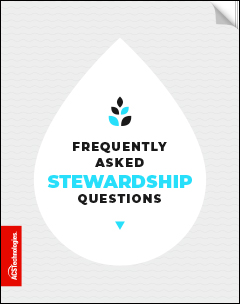Sometimes the best fundraisers are not fundraisers at all.
In years of doing this work with ministries, we sometimes find that the people who best inspire giving weren’t trained to do that. As pastors and ministry leaders, when it comes to any staff we’re privileged to lead, we’re rightfully focused on getting the jobs done, hiring the best people we can, and setting the pace. We often lose sight of the role our staff and key volunteers can play in our donor relationships.
In this blog series, we are answering the most frequently asked questions churches ask about stewardship and fundraising. I get plenty of questions about who should be doing development work in the church. So let’s dive into those today.
FAQ #5: Can anyone learn to work with donors?
As I mentioned, sometimes the most effective fundraisers are frontline program staff. Most staff can – and I’d argue should – learn to work with and steward donors. I’m not simply talking about who is making “an ask” of a major donor…we’re looking at this work holistically, as a ministry. Remember that 80 percent of our time with our givers should be spent on relationships and trust-building.
In order to create a church culture conducive to relational donor work, we have to get “over the hump” of thinking about this as a new kind of formula for success. It’s about loving the people who support the church’s mission, believing they’re happier and healthier when they’re giving, and inspiring them to step up to the fullness of their potential as supporters.
Program and ministry staff do not need to see a move toward relationship with donors as a departure from their purpose. It is an extension, a new facet, of their purpose. Who is better to inspire givers about the future of your children’s ministry expansion project than your children’s ministry director? Who knows those families and their individual passions better than that person or his/her staff?
What do donors need?
Donors need ministry just as surely as Sunday school attendees or recovering alcoholics. Those donors need the care and attention of a friend more than our church needs their money. But as they receive ministry from a person who is passionate about a certain mission in the church, it is appropriate that their giving will flow toward the mission.
To develop a new culture in your church, you must begin with the most basic fundamentals. Training and leading your staff from the ground up. It may even feel a bit infantile at first. But you have to start with the basic question, Why are we here? and build from there.
A pilot leaving New York City and heading for London will totally miss the British Isles if his heading is one degree off. To arrive at the destination of a healthy culture, start right. In creating a healthy new culture within our churches and ministry organizations, we must ensure that the entire team is on the same page at the same time working toward the same goals. They need to see their roles as integrated and overlapping. They must not persist as a number of teams, each doing its own thing, but rather as one team. With each member contributing to the success of the whole. Team play wins games. The church wins, and — of at least equal importance, if not more — our givers win.
FAQ #6: Should the head pastor always be the one to make ‘the ask’?
Churches and ministry organizations are often stuck on who should make “the ask” of a donor. It’s something I get consistent questions about, and I understand that there’s some thinking that this step requires a kind of special training. While there are donor-centered best practices and methods for presenting and making an ask, this moment is simply another step in the relationship you’ve built with your giver.
An ask should not come as a huge surprise to the giver, but rather as a natural extension of your ongoing conversations. The staff or key volunteers most connected to the giver should have a role in it. Does the head pastor need to be the one to make the ask? It depends on the donor. Most often, we find the weight and importance of a major gift should involve the lead pastor. Even if he or she isn’t the asker. In the rare times that isn’t the case, the lead pastor should connect with, thank and steward the giver. Regardless of the outcome of the ask.
Conclusion
Pastors, your staff’s involvement in this process – from cultivation to an ask – is critical. Our greatest impact with donors will be seen in their long-term retention. The difference between the donor who gives a one-time gift and the donor who engages for a lifetime really boils down to personal relationships. And the systems and staff that drive, connect, organize, and maintain those relationships.
We’ve walked through the most common questions I get as I work with churches and ministries. As we conclude this series in the next blog, I’ll offer pointers for improving your donor relations program.
Answers to Frequently Asked Stewardship Questions
Fundraising is part art and part science…and it can feel intimidating for pastors and ministry leaders suddenly charged with donor development.
This article provides answers to the six most commonly asked questions about stewardship – from the pastor’s role in making an ask of a donor to how frequently we should be asking givers for support.
Tim Smith has over 30 years of experience in Church, Non-Profit Administration, Management, and Fund Development. Serving as an Executive Pastor and Chief Development Officer in growing Churches and Non-Profit Organizations has provided a wide range of expertise and resources. Tim serves as Founder and CEO for Non-Profit DNA. A boutique firm committed to helping nonprofits and churches build their capacity through fundraising, leadership, team building, staff recruiting, and coaching.





